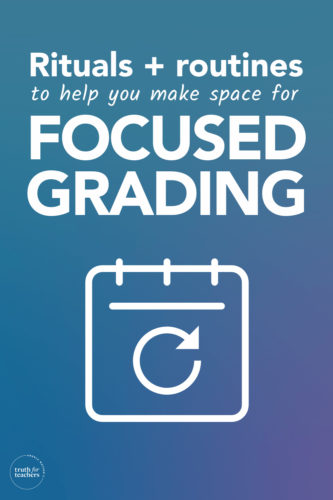
06 Oct Rituals + routines to help you make space for focused grading
 This article is written by Truth for Teachers writer Candace Brown.
This article is written by Truth for Teachers writer Candace Brown.
Have you read If You Give a Mouse a Cookie? That’s me when I know I’ve got things to grade and work to do. Every little thing will distract me, from notification pings to suddenly having the desire to Marie-Kondo my space (tidying up is life-changing magic as well as a useful procrastination tool).
At this point in many of our teaching journeys, we are relearning how to work in the spaces where we are allowed. The staggering differences in our work environments — from changing office spaces to living room couches — can easily overwhelm our familiar systems in times of change. After all, how can we still do our jobs well when so much of our lives have changed? On top of that, how can we still find the energy to grade things? *Cue the mouse eating the cookie.*
If you are a teacher in the world in 2021, you might have had these thoughts at some point in the last year or yesterday:
How can I find the focus to get work done?
How can I keep my home separate from my work, even when I work from home?
How can I rest — really rest?
I have to be honest, though; much of my teaching structure has not changed in the last year of the pandemic. I know. How can I pretend to know what it’s like to restructure everything?
My frame of reference goes to the moment that a colleague recommended me to enroll in the 40-hour Teacher Workweek a few years ago; she had watched and heard me become overwhelmed with grading — especially as an adult with ADD — and she knew that 40HTW could change my trajectory like a hard right turn on a backroad.
Since completing the 40HTW in 2018, I’ve adjusted the principles to meet my needs in my own context. I work at an American international school in Taiwan, a country that wore masks comfortably long before the pandemic (because of being sick, avoiding pollution, having a pimple, etc.). Since moving to Taiwan and beginning my teaching career, I’ve been relearning how to focus and grade in my context.
My goal is not to tell you what to grade with this article (I can give you the tools to turn the steering wheel on your trajectory, too). I’ll also be giving you hacks from my ADD experience of focus that can benefit both ADD and non-ADD educators.

1. Make physical space.
Do not grade anywhere that you eat, relax, sleep, or even check your phone routinely. Even if the only place you can work is your kitchen table (though you should try not to work where people might interrupt you at home), assign seats for tasks. When I’m working at my kitchen table, I have an eating chair, a working chair, and a “put your head down and GRADE” chair. I actually get hungry if I try to work while sitting in my eating chair.
ADD Hack: Have an assigned tea for work time. This sounds silly, but studies show that your memory is more easily accessed when you connect it to a smell and taste. According to Psychologist and neuroscientist Hadley Bergstrom, “Taste memories tend to be the strongest of associative memories that you can make.”
I used to study for classes exclusively with cinnamon tea so that I could then chew cinnamon gum during tests (it worked startlingly well). For working at home, I drink blueberry tea because of its delicious, pungent flavor that doesn’t turn bitter even when the tea goes cold.
2. Make mental space.
Write everything down. Seriously.
If you’re the type of person that keeps your “To-Do” list on your phone, consider switching to the “To-Do” list extension in your Gmail. If even checking that list via Gmail sends you into a Wonderland of seemingly-more-important-than-your-grading emails, consider using paper. Once your task is written down, covet to not think about that task until you’re ready for it.
I loved the printout PDF of the 40HTW to-do list, but now, I keep all of my To-Dos in my Erin Condren Teacher Lesson Planner. If you want this planner, know that the company restocks the next calendar year in the spring. The planner has the benefits of the same structure of “to-do” area as the 40HTW planner (along with ways to split up my types of To-Dos by personal, grading, teaching, etc.), a full-calendar year, a gradebook, and grid pages for other types of planning. If you think this leather-bound planner is too plain, check out the whole beautiful collection!).
ADD Hack: Fidget.
Wait. What?
Yes. Notice how you are moving in small, non-distracting ways and lean into that. According to Dr. John R Ratey in Spark: The Revolutionary New Science of Exercise and the Brain, small repetitive physical activities, or fidgeting, can increase neurotransmitters in our brain in a way that increases focus and attention. I shift my weight in my seat, rub one foot on the other, and scratch the pads of my thumbs with my forefinger.
ADD Hack: disable notifications on your phone (set to Do Not Disturb), your computer (Settings->Notifications->Do Not Disturb on Mac), and your life when you’re grading (politely tell your loved ones that you can’t do anything during 6-7p on Tuesdays because that time is already scheduled).
3. CLEAR mental space.
When you are feeling that notification of “your computer is out of memory and scratch disk space is full” (what even is a scratch disk?) in your own brain OR you are having a hard time turning off “school” in a healthy way, consider these tips:
Reset your eyes every 20 minutes using the 20-20-20 rule. Every 20 minutes, stare at an object 20 feet away for 20 seconds. It’s so helpful in staving off those burning eye twitches after staring into the eyes of Google Drive for hours.
When you’re finished grading or working for the day, do something physical followed by a clear “winding down” practice. As soon as I finish work, I workout, shower, and change clothes. If you do some version of this out of order like working at night after you shower, still do some sort of activity (NOT watching TV or scrolling through social media) regularly that lets your brain know when it’s time to shelve the material it had open on your mental tables for school. If I have to work later, I will also wash dishes before following my bedtime routine.
If school is on your mind while you’re trying to sleep, keep a notepad by your bed and write down those intrusive thoughts (“I will update the gradebook tomorrow”).
4. Give yourself grace.
Most importantly, recognize the power that our own thoughts about our work have on us. If we are constantly thinking about how distracted we are or how annoying it is to do the work that we do on our own personal time, our bodies and hearts will follow with the focus we’ve allotted. If we instead reinforce the good thoughts we have, we can trick (avoid the negative connotation here) our minds into producing more focus and attention for longer.
I am not perfect, and my work conditions may be less-than-ideal right now, but everyone else is in the same boat. That’s okay. I can work well under pressure. I can face challenges and adapt. I can adjust my grading practices to meet the needs of my students. Isn’t that what it’s all about anyway?
The post Rituals + routines to help you make space for focused grading appeared first on Truth For Teachers.
This article is written by Truth for Teachers writer Candace Brown. Have you read If You Give a Mouse a Cookie? That’s me when I know I’ve got things to grade and work to do. Every little thing will distract me, from notification pings to suddenly having the desire to Marie-Kondo my space (tidying up … Continued
The post Rituals + routines to help you make space for focused grading appeared first on Truth For Teachers. UncategorizedRead More
UncategorizedRead More

Sorry, the comment form is closed at this time.